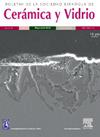BaTiAl6O12 陶瓷的基本微观结构、机械、电气和光学特性分析
IF 2.7
4区 材料科学
Q1 MATERIALS SCIENCE, CERAMICS
Boletin de la Sociedad Espanola de Ceramica y Vidrio
Pub Date : 2024-09-01
DOI:10.1016/j.bsecv.2024.06.002
引用次数: 0
摘要
在基于 BaTiO3 和 Al2O3 组合的渐进式颗粒或层状复合材料(如陶瓷收割机)中,在热处理过程中会形成新的相。其中最主要的是 BaTiAl6O12。这项研究提供了有关 BaTiAl6O12 陶瓷的微观结构、机械和光学特性的信息。在 BaTiAl6O12 的固态反应合成过程中,对相的演变进行了监测。通过火花等离子烧结制备的全致密样品的压痕维氏硬度和压痕弹性模量在 10.1-13.7 GPa 和 132.0-187.0 GPa 范围内,具体取决于加载力。BaTiAl6O12 样品的三点弯曲测试结果显示其抗弯强度为 129.9 兆帕,断裂韧性为 1.8 兆帕 m1/2。由于 Ti4+ 和缺陷位点的电荷转移转变,样品在紫外激发下显示出蓝色宽带发射。在频率为 1 kHz 时,BaTiAl6O12 的介电常数(ɛ′)= 16,介电损耗(tan δ)<0.0003。本文章由计算机程序翻译,如有差异,请以英文原文为准。
Basic microstructural, mechanical, electrical and optical characterisation of BaTiAl6O12 ceramics
In progressive particle or layered composites based on a combination of BaTiO3 and Al2O3, serving as e.g. ceramic harvesters, new phases are formed during heat treatment. The dominant one is BaTiAl6O12. This study provides information about the microstructural, mechanical and optical properties of the BaTiAl6O12 ceramics. The evolution of the phases during the solid-state reaction synthesis of the BaTiAl6O12 was monitored. The fully dense samples prepared by spark plasma sintering had indentation Vickers hardness and indentation elastic modulus within ranges of 10.1–13.7 GPa and 132.0–187.0 GPa, depending on loading force. The three-point bending tests of the BaTiAl6O12 samples resulted in flexural strength of 129.9 MPa and fracture toughness of 1.8 MPa m1/2. The sample showed blue broad-band emission under UV excitation due to the charge-transfer transition of the Ti4+ and defect sites. The BaTiAl6O12 evinced low permittivity (ɛ′) = 16 and dielectric loss (tan δ) <0.0003 at a frequency 1 kHz.
求助全文
通过发布文献求助,成功后即可免费获取论文全文。
去求助
来源期刊

Boletin de la Sociedad Espanola de Ceramica y Vidrio
工程技术-材料科学:硅酸盐
CiteScore
5.50
自引率
2.90%
发文量
72
审稿时长
103 days
期刊介绍:
The Journal of the Spanish Ceramic and Glass Society publishes scientific articles and communications describing original research and reviews relating to ceramic materials and glasses. The main interests are on novel generic science and technology establishing the relationships between synthesis, processing microstructure and properties of materials. Papers may deal with ceramics and glasses included in any of the conventional categories: structural, functional, traditional, composites and cultural heritage. The main objective of the Journal of the Spanish Ceramic and Glass Society is to sustain a high standard research quality by means of appropriate reviewing procedures.
 求助内容:
求助内容: 应助结果提醒方式:
应助结果提醒方式:


